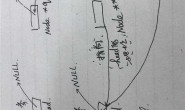|
为社么这样不可以: #include “stdio.h” void main() char *string; /* Allocate space for a path name */ } |
|
| 30分 |
作了一些改动。
#include “stdio.h” //———->#include <stdio.h> |
|
上面注释中的程序是我的改动。
|
|
|
因为malloc被定义为空指针void * , 因此在具体分配内存时应将malloc转换成相应的数据类型。
string = (char*)malloc(sizeof(“memory”)) ; 另外free(string)后应将string==NULL;当然,这是个好习惯,但不影响编译。 |
|
|
点评你的程序,一起学习
#include “malloc.h” void main() { char *string; /* Allocate space for a path name */ string = malloc( sizeof(“memory”) ); /*”memory”是一个const char* 类型,取长度任何指针都是4,32位的操作系统 malloc返回void*类型,应强制转换 这句应该改为string=(void*)malloc(strlen(sizeof(“memory”)+1);//加1留给字符串的””/0″”字符 */ if( string == NULL ) printf( “Insufficient memory available\n” ); else { string = “memory”; /* 将const char*指针赋给string,不应释放。这种常量字符串内存不是动态申请的 你的意思是想,将string指向的内容修改 memcpy(string,”memory”,strlen(“memory”)); */ printf( “Memory space allocated for path name\n” ); /*帮你加一句 if(string!=NULL) */ free( string ); /* */ |
|
|
在标准C里面
char * s = malloc(20); 是完全正确的,也算是个好习惯,但是C++不行,为了兼容C++,所以最好 进行类型转换 你那句string = “memory”; |
|
|
你的malloc返回的是void*,而string是char*,所以不行了::#include “stdio.h”
#include “malloc.h” void main() { char *string; /* Allocate space for a path name */ string =(char*) malloc( sizeof(“memory”) ); if( string == NULL ) printf( “Insufficient memory available\n” ); else { string = “memory”; printf( “Memory space allocated for path name\n” ); free( string ); printf( “Memory freed\n” ); } } |
|
|
谢谢大家,我知道错误在那里了,不应该直接用string = “memory”;赋值,
至于string = malloc(sizeof(“memory”));我不认为有错. 这段程序是MSDN上的例子,只是我加了一句string = “memory”; 再次谢谢大家 |
|
|
sizeof没有错么?
|
|
|
sizeof(“memory”)我跟踪了
等于4 |
|
|
sizeof(“memory”)我跟踪了
等于4 |
|



